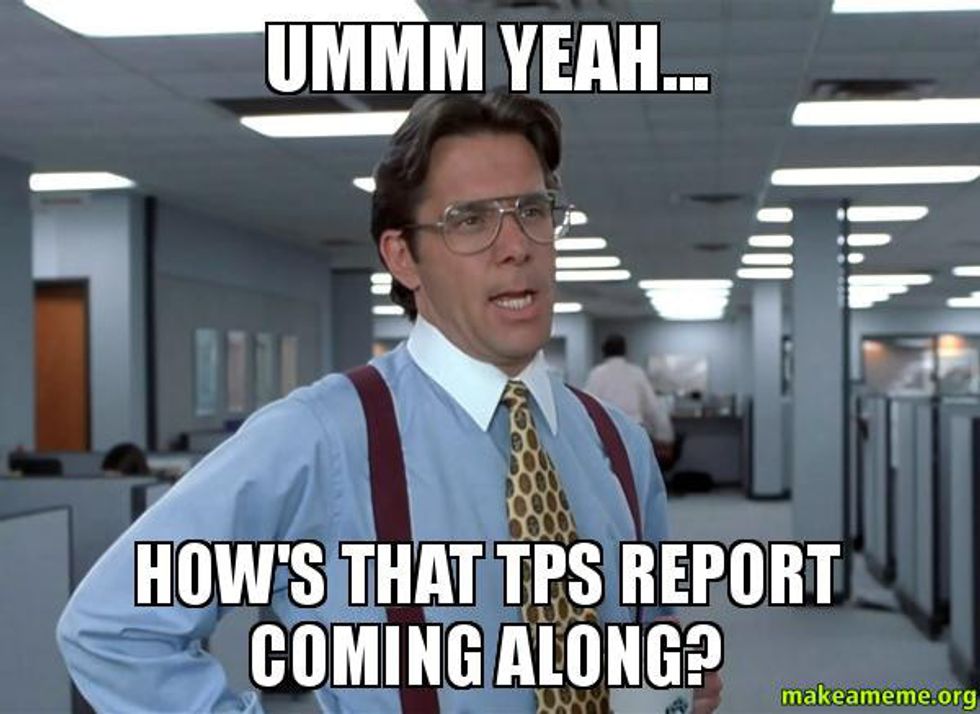I find that a great deal of my time at the office – between trips to the bathroom and the cheeseball table – is spent crafting emails, and over the years I’ve come to see that there’s really more of an art to it than many people think. Being clear and concise isn’t always easy, and there are many common mistakes you should avoid if you – as a low-level corporate nobody that still buys dress clothes at Dollar General – ever hope to get out of the mailroom without blackmailing an executive. Lucky for you, I’ve compiled the following list of dos and don’ts that – if followed judiciously – will put you on the fast track to the top, assuming you are also sleeping with one or more members of upper management.
Step 1) Keep it short.
Veering off topic is a common mistake, as is being too wordy. Before I developed these rules I would routinely skim over my notes before sending them only to find that I’d written something like this:
Gentlemen,
I am very happy and glad to let you know, by way of this announcement – being sent via email – that the thing that we were anticipating to happen during December, which is now upon us, has indeed come to fruition and occurred and, having happened, thereby completes the requirements that were discussed at the last requirements review where we covered both them (the requirements), and their expected December completion date, which has now been reached as it is currently December.
This email has far too many superfluous words floating around in it – it’s hard to say how they got there, exactly, though I suspect autocorrect is to blame. In order to remedy this situation, the first thing you need to realize is that no one actually cares what you have to say – especially not important people in suits. They’re far too busy worrying about the lease on their new Mercedes or the minibar and stewardess selections on the company jet to be bothered with your problems, so when writing to them, the above email should be “tightened up” to look more like this:
Mr. Petermeyer,
Kindly go syngerize yourself.
V/R,
Employee 834611029
It would be even better if you couldn’t shorten it further.
2) Know who you’re writing, and who you are
I don’t know if this has ever happened to any of you, but I recently received an email addressed to "Kurt". This happens quite frequently, actually, which is strange, because my name is "Dan". I know, because it's in my signature block, and because I sign almost every one of my outgoing emails with it, whereas I almost never sign things with "Kurt.” To be fair, my last name does resemble Kurt, but I don’t go by my last name, and yet I continue to get these emails. If you find yourself in a similar situation, the most obvious solution is to change your name altogether to something completely unique; something like, "Frederico Gewurztenplatz", or maybe “Cynthia Featherbottom”. People would remember those names! Back in college my roommates and I – who, in retrospect, may have been a tiny bit nerdy – made up several categories of names for each other, including Roman, Native American, and rap. It’s hard to remember them all now, but I believe I was known in Roman circles as Optimus, whereas my grouchier roommate was referred to as Pessimus. Our Native American names were equally clever, including such gems as “Unpleasant like Ragweed”, “Fuzzy Otter”, and “Farts like Wind”. To avoid incriminating anyone I won’t discuss which moniker belonged to which roommate, except to say that they were a little unfair given that – to save money – I was living on a diet that consisted almost exclusively of Totinos pizzas and frozen burritos at the time. The rap names included “Skoo Grl” and “Suga Loaf”, but being that we were exceptionally white engineering students in the middle of rural Iowa, we lacked the street cred to use the rap names very often. At any rate, imagine how cool it would be to receive professional type emails addressed to “Optimus”:
Optimus,
Several clients report being attacked by dastardly online trolls – we must put a stop to this immediately! Summon the others for a strategy meeting in 10min.
even “Farts like Wind” might be interesting:
Farts like Wind,
A main pressure valve blew out during the early hours of the morning, and natural gas is still escaping at an alarming rate. Area residents are reporting overwhelming and unbearable odors. It’s a mess. Disaster planning meeting in the conference room in 10min…though actually, you can feel free to just dial in from your office…
Alternatively, you could just change your last name to something that would sound appropriate as a salutation, such as “Heyman,” “Dude,” or “Secksmasheen.”
3) Nail the closing
Once you’ve written a killer email and addressed it to the appropriate person, you’ll want to make sure you don’t blow it all by screwing up the closing. Many people struggle with how best to close a professional email, and rightfully so; it’s an important decision full of nuance and subtext that could land you a permanent spot on the third-shift janitorial team if not executed correctly! For instance, you almost never want to end important client emails with either “Later Gator!” or “Peace Out, Bro,” and authority figures forged in the cold, emotionless crucible of corporate America almost universally frown on using “Love”, or even “Affectionately Yours.” “XOXO” is sadly also out, unless you’re going for the aforementioned blackmail angle, and even “Sincerely” can come off a bit strong. So what are we left with? “Respectfully?” “Very Respectfully?” Perhaps a simple, “V/R?” And when do you choose one over the others? Do you reserve the ”Very” for only the most intense corporate butt-kissing emails? These are difficult decisions, and therefore ones that I prefer to ignore altogether, which is why I sign 99% of my emails simply with “Thanks,” even when I haven’t asked for anything. It’s simple, generically friendly, and makes people feel appreciated even when they possess all the useful qualities of a bucket of soiled kitty litter. Such faux friendliness helps promote relationships that you’ll be able to exploit for advancement later, as people that feel appreciated never see that bus coming.
4) Choose the correct Signature Block Catchphrase
Finally, let’s take a look at your signature block – the all-important stamp at the end of your emails that lets people know who you are and how to reach you. Many people choose to put their favorite quote in this info section, and why not? There are lots of great quotes out there, attributed to everyone from Winston Churchill:
“Success consists of going from failure to failure without loss of enthusiasm”
To Muhammed Ali:
“Superman don’t need no seatbelt”
To PeeWee Herman,
“I know you are, but what am I?!”
So how do you choose the one that best represents your personal belief system and outlook on life? It’s actually easier than you think! There are lots of great websites dedicated to famous quotes, but what I suggest is that you ignore them completely and grab some tacos, because email signature taglines are irritating and stupid, and identify you as a giant doofus. No one at the office cares about your value

So there you have it folks! The sum total of my experience from 14 years of corporate mediocrity! Use it wisely, and I’ll see you at the next board meeting! I’ll be the guy cleaning the toilets…
Thanks,
Kurt
Like this? Find more and follow me at Reluctantlyaging.com





















